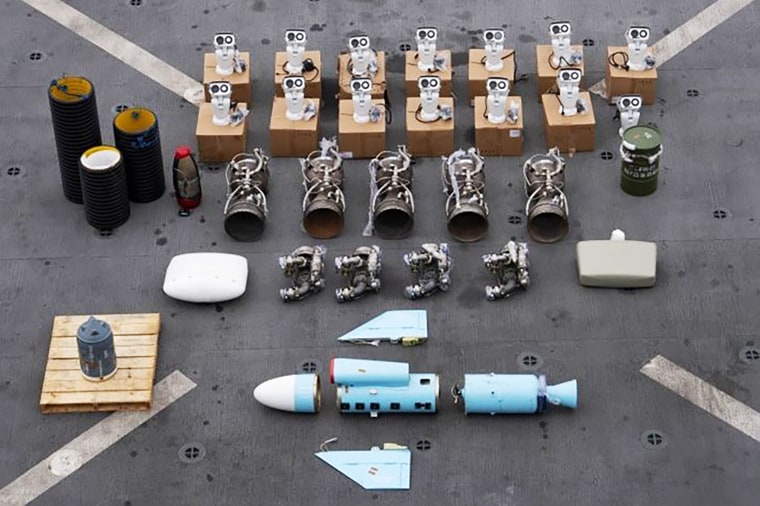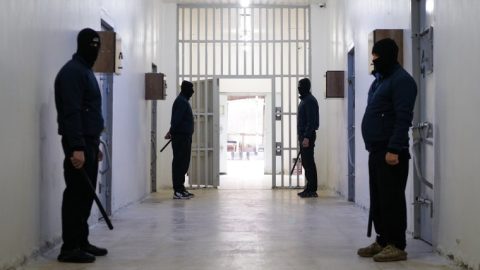A team of Navy SEALs that lost two sailors overboard while searching a small boat off the coast of Somalia went on to find Iranian missile parts bound for Tehran-backed Houthi rebels in Yemen, the U.S. military said Tuesday.
American ships and aircraft are continuing a huge search and rescue mission in the Gulf of Aden, between Yemen and Somalia, after the two SEALs disappeared into rough, nighttime seas during the boarding operation last Thursday.
Despite losing their two crew members, the team went on to find “Iranian-made ballistic missile and cruise missiles components” including propulsion, guidance, and warheads for medium-range ballistic missiles and anti-ship cruise missiles, U.S. Central Command, which oversees the military in the Middle East and parts of Asia, said in a statement posted on X.
CENTCOM said that the arms discovered by the SEALs were the same type of weapons that the Houthis have used to attack international merchant shipping in the Red Sea — jeopardizing a vital maritime artery in what the militant group says is a protest against Israel’s war in the Gaza Strip.

The team, attached to the 5th Fleet based in Bahrain, were on board the USS Lewis B. Puller, which the Navy describes as a “mobile sea base.” They identified a small boat, known as a dhow, that was not flagged to any country and had no paperwork so decided to board it using a smaller, fast vessel called a rigid-hulled inflatable boat, or RHIB, three defense officials told NBC News.
During their attempt, one of the sailors was knocked overboard and another one jumped in after them, the officials said.
“We are conducting an exhaustive search for our missing teammates,” Gen. Michael Erik Kurilla, CENTCOM commander, said in the statement.
The 14 crew members of the unflagged vessel were detained and would be dealt with “in accordance with international law,” CENTCOM said. The missile parts were confiscated, and the dhow sunk, per standard protocol, the officials said.
“It is clear that Iran continues shipment of advanced lethal aid to the Houthis,” Kurilla said. “This is yet another example of how Iran actively sows instability throughout the region in direct violation” of “international law.”
The search comes amid renewed international focus on Yemen’s Houthis, who have been launching attacks against international shipping in the Red Sea, which the Gulf of Aden leads into. They say they are only targeting Israel-linked ships — a claim that has been widely disputed — in protest against Israel’s war in Gaza and in support of their fellow Iran-backed militants Hamas.
In response to these Houthi attacks on shipping, the U.S. and its allies have started an international mission to protect this vital maritime artery. The SEALs’ search last week was not part of this mission but rather a broader practice by Western allies in recent years to apprehend dhows allegedly responsible for ferrying Iranian weapons to the Houthis, a charge Iran denies.
On Monday, U.S. Central Command said in a statement that Houthis “fired an anti-ship ballistic missile from Houthi-controlled areas of Yemen and struck the M/V Gibraltar Eagle, a Marshall Islands-flagged, U.S.-owned and operated container ship.”
And Sunday, a U.S. fighter jet shot down an anti-ship cruise missile fired toward an American destroyer in the Red Sea from Houthi militant-controlled areas of Yemen, the U.S. military said.
It appeared to be the first Houthi attack since U.S.-led strikes on sites the rebel group controls in Yemen, the latest of which targeted a Houthi radar site Saturday night.









Recent Comments